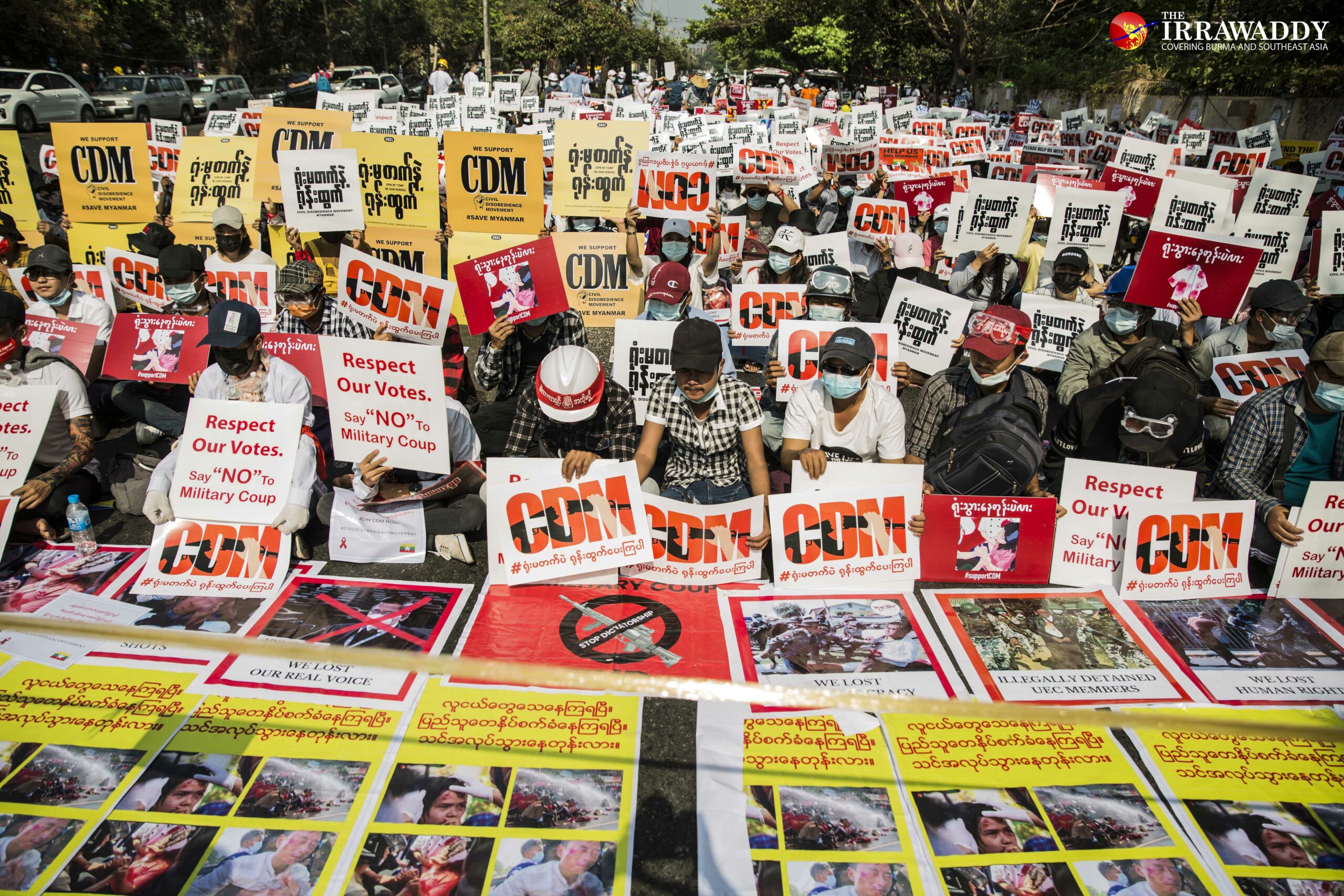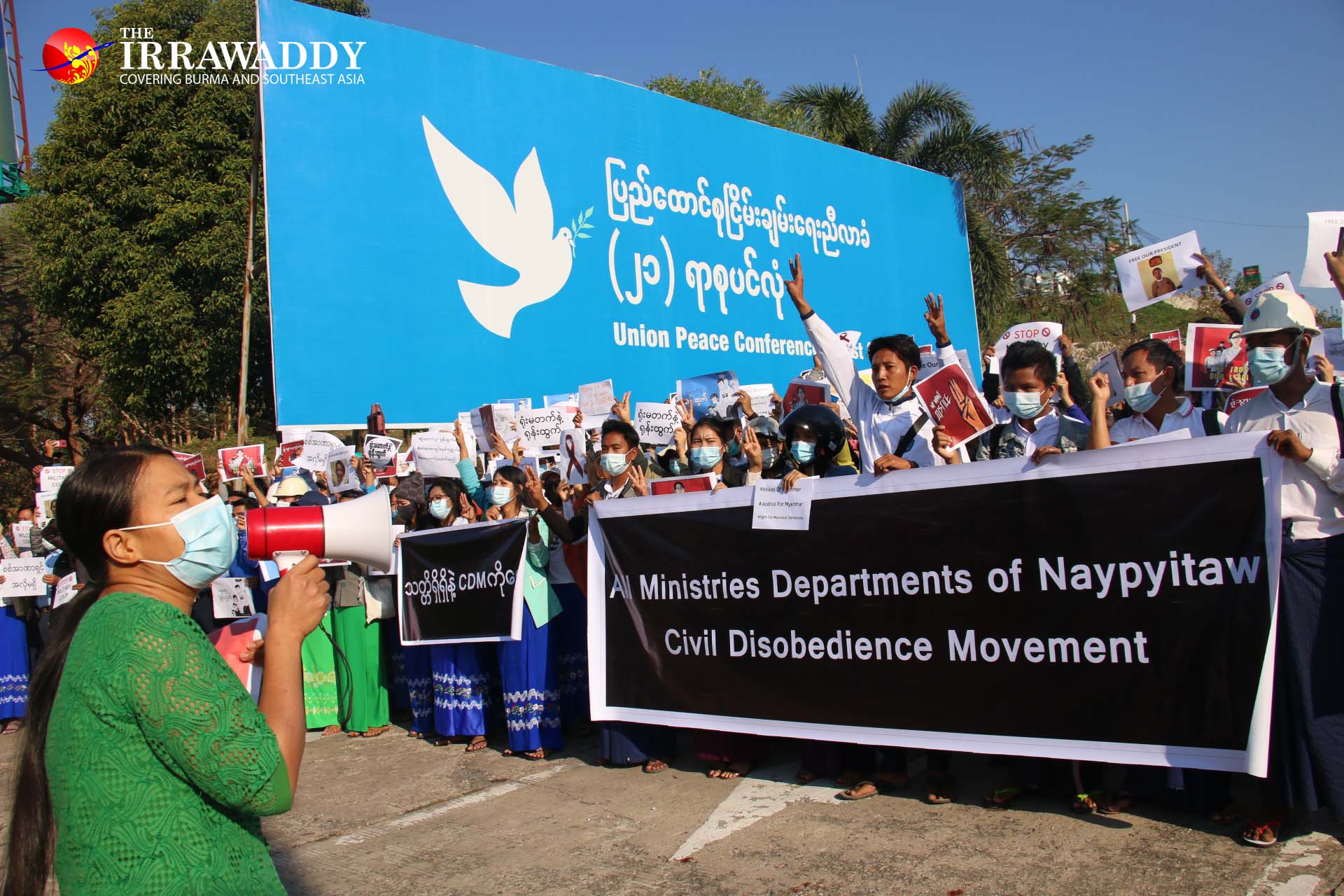YANGON – Operations at many government departments in Myanmar all but halted this week as staff refused to work for the military regime, which early this month seized power from Myanmar’s democratically elected government.
Many hospitals, banks, municipal departments and other government offices have been deserted as their employees have joined the growing Civil Disobedience Movement (CDM), staying at home or urging other civil servants to join the movement by taking part in anti-coup protests.
In Yangon on Tuesday, township General Administration Department offices and a few government-run banks were found to be open. But the banks had to struggle with a very small number of staff.
A director of a township labor department told The Irrawaddy that some labor departments are closed because staff have been on strike against military rule.
Many protesters have opted to join the CDM since ousted leader Daw Aung San Suu Kyi urged people to resist the coup.
It was initiated by medical staff at government hospitals, and others followed suit.
The impact of the medics’ CDM was so huge that coup leader Senior General Min Aung Hlaing himself urged them to go back to work. Undermanned government hospitals have been turning away new admissions, and some have closed.

Nearly 500 staff including at the director level under the ministries of Commerce, Electricity and Energy, Transport and Communications, and Agriculture, Livestock and Irrigation, joined the CDM in Naypyitaw last week.
Since Monday, public support for the CDM has intensified. People have staged sit-ins in front of government offices, calling on their workers to join them.
An official from state-owned Myanmar Economic Bank in Yangon’s Insein Township told The Irrawaddy that his bank was struggling to maintain operations after 30 staff went on strike against military rule. Hundreds of demonstrators outside called on the staff inside to take part in the CDM.
The Government Office complex in Insein Township, which is normally crowded during office hours, was deserted when The Irrawaddy visited it.
Another government sector hard hit by the CDM is transportation. Staff from Myanmar Railways (MR) in Yangon and Mandalay have proven to be second only to the medics in their participation, with 99 percent of railway employees on strike, according to an official from MR.
U Myo Myint Saw, who is in charge of the mechanical department at the Insein Locomotive Shed, told The Irrawaddy on Tuesday that all 245 staff at the shed joined the CDM last week. As result, the circular rail service, one of the transportation lifelines for many Yangon residents, has been halted, he said.
“Nearly all MR staff are in the CDM,” he said.
He admitted that there had been some pressure from upstairs, including threats that workers would be “kicked out of their staff quarters” if they didn’t to go back to work.
U Myo Myint Saw said staff at the shed were still resistant because they simply didn’t want to work under the military regime.
“We will be paid the same as under the NLD government. But we don’t like the military dictatorship. That’s why we are all in the movement to bring back the good system [a democratically elected government],” he explained while calling on staff at other ministries to join the movement.

However, regime spokesperson Brigadier General Zaw Min Tun told the media at the regime’s first post-coup press conference on Tuesday that “the government mechanism is functioning well,” as there were some dutiful civil servants at work, while issuing warnings to those in the movement.
“We are giving them some time to go back to work. If they fail, there will be unavoidable legal action against them,” he said.
Contrary to the spokesperson’s claim, U Tun Htet Naing, a deputy staff officer at the Rural Development Department in Natogyi Township, Mandalay Region, said nearly 200 of the department’s more than 300 staff in Mandalay have joined the CDM.
He said his township office had not been operating since Feb. 8, as more than half of his 13-strong staff, including himself, had been on strike since then.
The official said he simply joined the CDM as he didn’t want a dictatorial government and he would stay in the movement till the elected government comes back.
Asked whether he feared retribution for his activism, he said:
“I joined because I am not afraid of being fired. I don’t mind if I’m sacked, but I can’t work for the dictator.”
You may also like these stories:
Myanmar’s Coup Leaders Name a New Union Election Commission
Power Grab Brings Myanmar to Standstill
Myanmar Coup Means Huge Losses for Thailand’s Border Trade

















